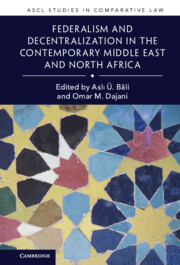Book contents
- Federalism and Decentralization in the Contemporary Middle East and North Africa
- ASCL Studies in Comparative Law
- Federalism and Decentralization in the Contemporary Middle East and North Africa
- Copyright page
- Contents
- Contributors
- Acknowledgments
- 1 Introduction
- Part I Theoretical and Comparative Context
- 2 Decentralization to Manage Identity Conflicts
- 3 Devolution and the Promotion (or Evasion) of Minority Rights
- 4 Constitutional Design Options for Territorial Cleavages in the Middle East
- 5 How Decentralization Efforts Have Recentralized Authority in the Arab Region
- Part II Decentralization and Governance Reform
- Part III Decentralization and Self-determination
- Part IV Decentralization, Conflict, and State Fragmentation
- Part V Conclusions
- Index
5 - How Decentralization Efforts Have Recentralized Authority in the Arab Region
from Part I - Theoretical and Comparative Context
Published online by Cambridge University Press: 15 January 2023
- Federalism and Decentralization in the Contemporary Middle East and North Africa
- ASCL Studies in Comparative Law
- Federalism and Decentralization in the Contemporary Middle East and North Africa
- Copyright page
- Contents
- Contributors
- Acknowledgments
- 1 Introduction
- Part I Theoretical and Comparative Context
- 2 Decentralization to Manage Identity Conflicts
- 3 Devolution and the Promotion (or Evasion) of Minority Rights
- 4 Constitutional Design Options for Territorial Cleavages in the Middle East
- 5 How Decentralization Efforts Have Recentralized Authority in the Arab Region
- Part II Decentralization and Governance Reform
- Part III Decentralization and Self-determination
- Part IV Decentralization, Conflict, and State Fragmentation
- Part V Conclusions
- Index
Summary
Has decentralization contributed to democratic accountability, civic engagement, transparency, and efforts to combat corruption in the contemporary Arab region? This chapter presents key findings from a two-year study assessing decentralization policies and initiatives in five countries – Jordan, Lebanon, Morocco, Tunisia, and Yemen. The chapter discusses several findings of our fieldwork. One is the legacy of colonial experiences which made deconcentration rather than decentralization prevail. Another is the simultaneous promotion and subversion of decentralization, which was not only practiced by governments across the region, but was often subsidized by international assistance. Still another finding discusses how effectiveness of local governments in the region is constrained by opaque regulatory environments and limited human and financial resources at their disposal. Finally, our study also points to instances of success and innovation, against many odds, where capable leadership, engaged civil society, and other factors have paved the way toward palpable improvements in service delivery and urban management. Accordingly, we find that, despite many constraints, decentralization policies in the Arab region may occasionally present significant policy windows that could form opportunities for social, political, and economic changes, if mobilized adequately.
Keywords
- Type
- Chapter
- Information
- Publisher: Cambridge University PressPrint publication year: 2023

